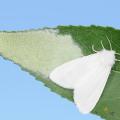Distribution of Periodical Cicadas in Mississippi
Blake Layton, Ph.D.
Extension Entomology Specialist
Periodical cicadas are remarkable insects that only occur in the eastern half of the United States. These insects have an unusually long life cycle, taking either 13 years or 17 years to complete a single generation, with all members of a particular generation emerging in the same year *. Thirteen-year cicadas occur in the southern portion of the US, while 17-year cicadas occur in more northern states. Members of a particular generation of periodical cicadas that emerge in the same year are known as “broods,” and the different broods are traditionally designated using Roman numerals. There are 12 broods of 17-year cicadas but only three broods of 13-year cicadas. Although thirteen-year cicada Brood XIX occurs in portions of 15 states, Brood XXII in parts of 2 states, and Brood XXIII in parts of 8 states, Mississippi is the only state in which all three broods of 13-year cicadas occur.
During the last three brood emergences, 2011, 2014 and 2015, we conducted a survey of periodical cicada occurrence in Mississippi. This was accomplished with the help of county extension personnel and Master Gardeners located within the area, with the primary objective being to document county level distribution of periodical cicadas within the state. County Extension offices were provided with vials of alcohol and data recording sheets and asked to collect up to five periodical cicadas and mail them in. From the returned samples, two cicadas from each county were pinned, labeled, and deposited as voucher specimens in the Mississippi Entomological Museum at Mississippi State University.
In 2011 Brood XIX periodical cicadas were collected from 17 counties in eastern MS with first collections occurring in Jasper County on April 24. In 2014, Brood XXII periodical cicadas were collected from seven counties in southwestern MS, and first collections were not made until May 11, in Amite County. Emergence occurred about two weeks later than anticipated due to cool spring weather. In 2015, Brood XXIII periodical cicadas were collected from 40 counties, with the earliest collection from Lincoln County on April 24. The following maps show the county distribution for each brood. Although these maps only show distribution within MS, each of these broods also occurs in other states during the same emergence year (See Cicada Mania for nationwide distribution maps and other information). For example, Brood XIX occurs in at least 14 other states, extending as far as southern Illinois.
* There are exceptions, periodical cicadas that emerge a year or more early, but numbers are low and early emergers do not survive to reproduce and establish new broods.



Publications
News
A grant from Coast Electric will allow for a renovation of the Mississippi State University Crosby Arboretum’s pollinator garden. Pat Drackett, director of the arboretum, said the pollinator garden was established in 2001 as the Explorers’ Garden. It is a 3,000-square-foot space with a variety of native and other plants that helps teach visitors how to create havens for pollinators.
The 2020 Fall Flower & Garden Fest will be a virtual, educational event this year.
A tent for camping in the woods can be a good thing, but a tent filled with caterpillars in a pecan tree can be bad news for homeowners.




